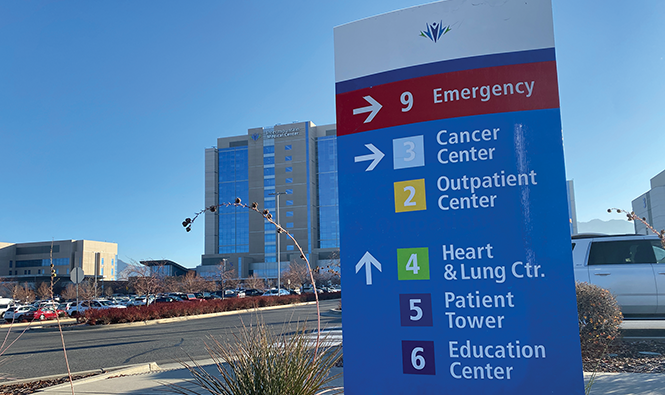Over the summer, Utah's critical blood shortage made headlines on more than one occasion. University of Utah Health, ARUP Blood Services, Intermountain Healthcare, and the Utah chapter of the American Red Cross all put out press releases asking the public to donate blood. The ongoing strain of the COVID-19 pandemic, an influx of trauma patients who required emergency blood transfusions, and a flood of long-delayed surgeries depleted Utah's typically robust blood supply.
In late June, Intermountain Medical Center in Murray experienced a harrowing weekend where the facility was completely out of O-positive blood products—the universal blood type providers use in emergency situations. After hours of scouring the state, Intermountain employees were able to remedy the shortage by importing blood products from other Utah facilities.
According to Dr. Sarah Ilstrup—who serves as clinical pathology medical director for Intermountain Healthcare—it is not uncommon to have a lull in blood collection during the summer months when school is out and people are traveling. But due to ongoing surges of COVID-19 cases, hospitals in Utah and across the country have been continually functioning at high capacity. As a result, there is an unseasonably high demand for blood products this fall.
Since the onset of the COVID-19 pandemic in March of 2020, blood collection across the country has not met demand. American Red Cross of Utah medical director Walter Kelley, MD, said that one of the great challenges of the pandemic has been finding venues to host blood drives, since schools and other community organizations have resorted to virtual or hybrid schedules.
Kelley said that despite the present shortage, communities across the state of Utah have historically been responsive to calls to donate blood. "Blood donors in Utah have an exceptional history of generosity, and we were fortunate that donors came out over the summer to bring supplies to a less-depleted level," Kelley said. "However, as patient need has increased, and other challenges have hampered our efforts to supply blood, we find ourselves in the current difficult circumstance."
Ilstrup said that trauma patients, postpartum patients who experience hemorrhages and surgical patients who undergo procedures that require blood support—such as liver transplants—are being significantly impacted by the blood shortage. And during the summer, certain cancer patients received a lower dose of platelets to preserve dwindling supplies.
Intermountain Healthcare is carefully planning surgeries and monitoring blood inventory to ensure that every patient who needs blood products will receive them. ARUP Blood Services, the American Red Cross and Intermountain Healthcare have been working together to ensure that patient needs are being met across the state.
Kelley encouraged every healthy, eligible person to donate blood. "With less than a day's supply of certain blood types in recent weeks, the Red Cross is requesting donors of all blood types—especially type O," Kelley said. "All blood donation is essential. Nearly everyone in the community knows someone who has either had cancer or received a blood transfusion for another reason. Blood donation is a personal opportunity for each of us to contribute directly to our friends and neighbors in their time of need."
In addition to personal donations, Ilstrup emphasized the importance of blood drives to help remedy the ongoing blood shortage. "The American Red Cross and America's Blood Centers are asking individuals, schools, businesses and other community organizations to consider hosting a blood drive," Ilstrup said. "Blood drives are critical to providing local blood donation opportunities."
Like Kelley, Ilstrup encouraged everyone who is eligible to donate blood to do so. For those who are wary of gathering in large groups or visiting medical facilities due to the Delta variant surge, the American Red Cross maintains strict COVID-19 protocols including masking, social distancing, and hand sanitizing to ensure that blood donation sites are safe and sanitary.
The American Red Cross website states that first-time blood donors often feel intimidated by the donation process. Kelley suggested that any person who feels jittery about giving blood should focus on the fact that people across the country depend on the kindness of blood donors.
Health care professionals across the state of Utah—stretched thin due to the pandemic—say they can't provide certain life-saving treatments unless local blood banks receive a steady supply of blood. But the shortage is also a pandemic-induced supply challenge that the average person has the power to remedy.
To donate blood, visit RedCrossBlood.org or utahblood.org.
More by Jenny Poplar
-
Break on Through
As the COVID-19 pandemic rages on, there's been a lot of talk about breakthrough infections in fully vaccinated individuals.
- Sep 15, 2021
-
The Midnight Sun
Every summer, a still from a vintage Twilight Zone episode called "The Midnight Sun" makes the rounds on my Facebook timeline.
- Jul 7, 2021
-
Done With Guns
Salt Lake itself went on to make the list of cities with a mass shooting.
- May 5, 2021
- More »
Latest in News
Readers also liked…
-
Raise a glass for E.L.T Harrison, architect of the Beerhive building on Main
Small Lake City
- Oct 11, 2023




